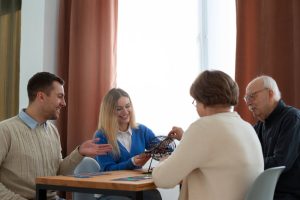Alzheimer’s disease (AD) and dementia refer to cognitive disorders that affect memory, thinking, behavior, and daily functioning. While dementia encompasses various causes beyond AD, it often refers specifically to the latter when used interchangeably.
Alzheimer’s is a progressive neurodegenerative disease characterized by beta-amyloid protein accumulation and neuronal cell death. Its onset typically occurs after age 65 but can occur earlier in individuals carrying specific genetic mutations or experiencing head injuries.
In this comprehensive blog, we will discuss coping strategies, lifestyle changes, and practical tips that extend beyond conventional advice, offering a roadmap to empower individuals facing Alzheimer’s or dementia.
Understanding the Emotional Impact
- Unveiling a Spectrum of Emotions: Coming to terms with an Alzheimer’s or dementia diagnosis is a unique journey for each individual. Acknowledge the range of emotions – from anger and shock to sadness and grief – without imposing preconceived notions of what one should feel. This emotional rollercoaster is normal and requires time for acceptance.
- Self-Compassion and Identity Reinforcement: Between the chaos, practice self-compassion. Alzheimer’s is not a personal failure, and self-blame is counterproductive. Reinforce your identity beyond the diagnosis; you are still a spouse, parent, friend, and more. Embrace these roles to maintain a sense of self amidst the challenges.
Navigating the Diagnosis Landscape
- Knowledge is Empowerment: Education is a mighty tool in facing dementia. Learn about the specific type of dementia diagnosed, be it Alzheimer’s, vascular dementia, or another variant. Armed with knowledge, individuals can better manage symptoms, slow progression, and actively participate in their healthcare journey.
- Early Diagnosis Matters: Timely diagnosis is paramount. Since dementia symptoms can stem from various conditions, swift intervention is critical. Address potential causes like stroke, drug interactions, tumors, or seizures immediately. Early intervention not only ensures accurate treatment but can also alleviate symptoms arising from other factors.
- Adapting the Environment: Simple environmental adjustments can preserve health and independence. From removing tripping hazards to incorporating daily routines and utilizing reminder notes, proactive measures enhance daily life. As needs evolve, planning and flexibility become essential in staying one step ahead.
Dynamic Coping Strategies
- Reach Out for Support: Isolation is a common response to a dementia diagnosis. Counteract this by actively seeking support. Maintain connections with family and friends, explore Alzheimer’s organizations, and consider spiritual counsel or professional therapy. The love and support of others significantly impact mood and outlook.
- Communication Strategies: Navigating conversations about the diagnosis is challenging. An open and honest conversation with loved ones is vital. Clearly express your feelings and the specific support needed. Keep communication ongoing, allowing for adjustments as everyone learns more about the disease and its challenges.
Lifestyle Changes for Cognitive Health
- Physical Exercise: Regular exercise is a potent ally in maintaining cognitive abilities. It stimulates the brain, fosters new connections, and slows cognitive decline. Incorporating physical exercise into daily routines is a proactive step towards preserving mental acuity.
- Nutrition and Brain Health: A brain-healthy diet, such as the MIND diet, can mitigate inflammation, protect neurons, and enhance communication between brain cells. Prioritize nutrition to support overall health, recognizing the symbiotic relationship between heart health and brain function.
- Mental Stimulation and Lifelong Learning: Continued learning and mental stimulation are crucial. Engage in activities that challenge the brain, reinforcing cognitive skills. Pursue hobbies, take classes, or join clubs to foster continuous mental engagement.
- Quality Sleep and Stress Management: Prioritize sleep as a mechanism to flush out brain toxins and prevent damaging plaques. Managing stress is equally vital, as chronic stress negatively impacts the brain. Incorporate relaxation practices to regain control and alleviate tension.
- Heart-Brain Connection: What benefits the heart benefits the brain. Control blood pressure, monitor cholesterol, limit alcohol intake, and quit smoking to promote both heart and brain health. Recognize the interconnectedness of these systems for overall well-being.
Nurturing Meaning and Joy in Life
- Meaningful Pursuits Beyond Diagnosis: Life with Alzheimer’s or dementia can still be meaningful. Engage in activities that bring pleasure and purpose. Pursue hobbies, build a legacy, participate in research or clinical trials, volunteer for a cause, travel, spend time in nature, and savor positive experiences.
Mental Health and Future Planning
- Addressing Depression and Anxiety: Depression and anxiety are common companions in early-stage Alzheimer’s. Acknowledge symptoms and seek help. Challenge anxious thoughts, talk openly about fears, and adopt lifestyle changes that positively impact mental health.
- Empowering Future Planning: While challenging, planning for the future is empowering. Address financial matters, communicate healthcare preferences, and appoint a trusted decision-maker for the time when autonomy diminishes. Early decisions mitigate confusion and ensure alignment with personal wishes.
Conclusion
In conclusion, an Alzheimer’s or dementia diagnosis is a transformative juncture that demands a multifaceted approach. This comprehensive blog goes beyond conventional advice, providing actionable steps for emotional well-being, lifestyle modifications, and proactive coping strategies.
By embracing knowledge, seeking support, and fostering a purposeful life, individuals can navigate this journey with resilience and maintain a fulfilling existence.
Remember, a diagnosis is not the conclusion; it’s the commencement of a journey where informed choices empower a meaningful life despite the challenges.





